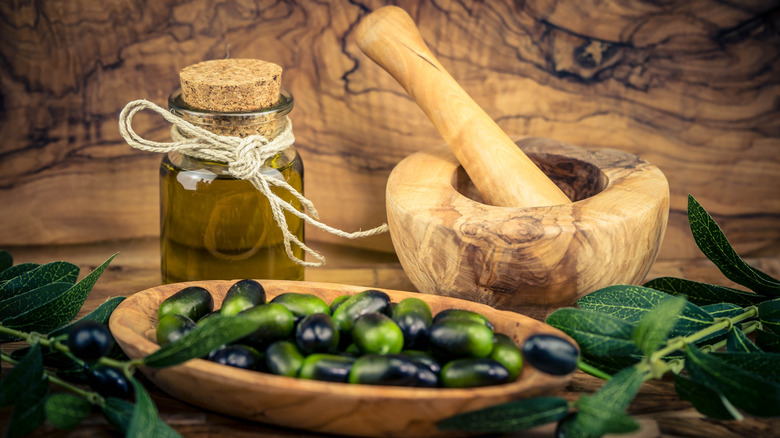Is Cold-Pressed Olive Oil Really Higher Quality Than Expeller-Pressed?
With so many different categories of olive oil on the market, it's hard to keep track of what different classifications represent. One commonly-seen specification is cold-pressed olive oil, so we turned to an expert to figure out what that means, what makes it more expensive, and if it's worth the price hike.
Food Republic spoke with Blessing Jennifer Anyibama, MSc, a Food and Nutritional Scientist, who helped us break down the specifics on cold-pressing and whether it's actually better than expeller-pressed oil — to which her answer is a resounding yes. "Cold-pressed is the gold standard for purity and taste — it is olive oil with its soul intact," she said. Call us crazy, but that sounds pretty good! As for what that means in practice, she explained, "Cold-pressed olive oil is pressed below 80 [degrees Fahrenheit], preserving delicate antioxidants, flavors, and aromas that heat would destroy."
On the other side of the equation are expeller-pressed oils. "Expeller-pressed uses friction and force, sometimes generating heat that compromises flavor," Anyibama noted. Similar to cold-pressed oils, the expeller process doesn't use additional chemicals, but in addition to the flavor occasionally being impacted by the process, the use of friction and heat can cause the oil to lose some of its nutrients that cold-pressed oil is able to retain.
What to look for when shopping for olive oil
There are some things to keep in mind when it comes to the superiority of cold-pressed oil, though. According to Blessing Jennifer Anyibama, the benefits of the process also come with a cost. "Nutritionally, it has a slight edge in polyphenols, but its shelf life is shorter, so use it while it's vibrant and fresh," she said.
Cold-pressing's maintenance of the original color and flavor of the fruit allows some room for bottle-by-bottle variation, producing a less mass-produced aesthetic. This is also the benefit of buying single-sourced olive oil. But while it's true that cold-pressed oil is generally higher quality, another reason for its higher price point is that it's the least efficient method of oil extraction, yielding the lowest percentage of oil from the fruit of any of the pressing processes.
It's also important to know what first cold pressing means and how it differs from purely cold-pressed olive oil. A first cold pressing can be included in refined oils, which are different from extra virgin olive oil. Refined oils are lower quality thanks to the inclusion of chemicals and heat to achieve uniformity and to extend their shelf lives. Therefore, it's important to check oils that use a first cold pressing on the label to ensure that they include extra virgin or unrefined in the ingredients list — otherwise, they may have refined oils added to them, with additives you're not expecting from something labeled "cold pressing."


